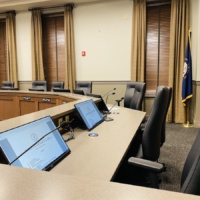Two privately owned buildings at the center of downtown Hopkinsville should be “demolished immediately” because of “severe structural issues,” according to reports from an engineer the city hired to inspect the South Main Street properties.
Hopkinsville City Council has called a special meeting for 6 p.m. Thursday to consider measures that could clear the way for demolition of the former Holland Opera House and the adjacent Lee’s Game Room building.
Signs declaring the properties “condemned” were posted on both buildings after structural engineer Kelly Gardner, of Owensboro, filed his reports with Hopkinsville Fire Marshall Chad Sivills on Jan. 31. Sivills accompanied Gardner on Jan. 24 when the engineer inspected interior portions of the two building.
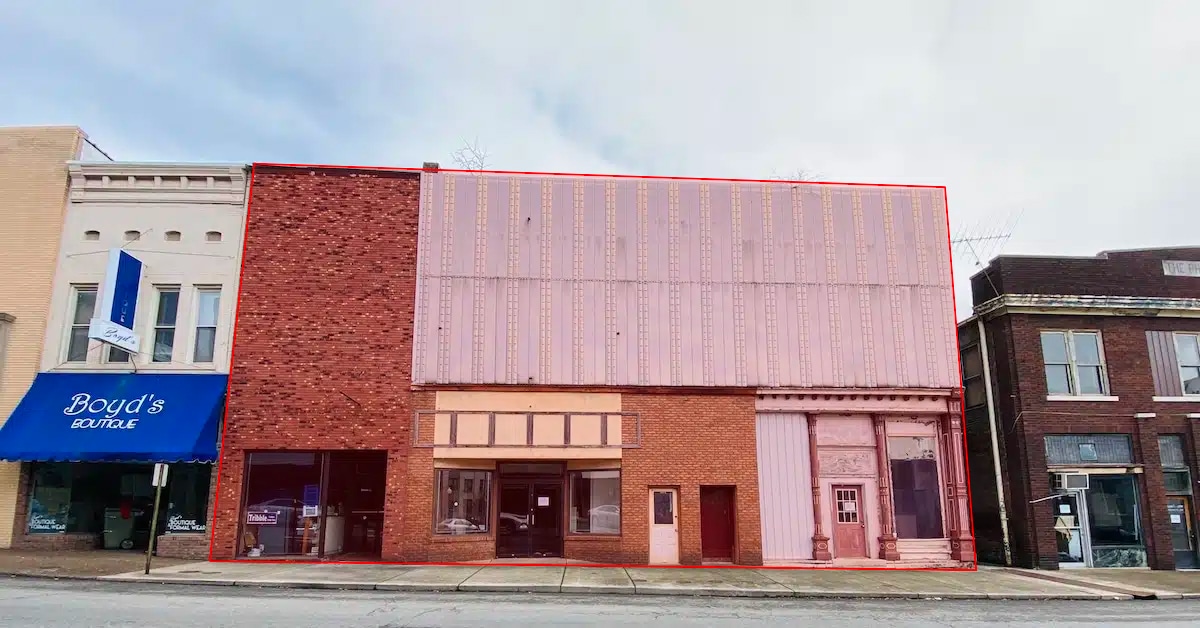
The city provided the engineer’s reports to Hoptown Chronicle through a Kentucky Open Record Act request.
Gardner’s findings are detailed in three reports — one is for Lee’s Game Room, a pool hall that was open to the public up until several weeks ago, and two are for the former Holland Opera House building, which previously housed Wood’s Drug Store and has been vacant for at least 10 years.
Both buildings are two stories, although the opera house originally had three floors. It was reduced to two floors after a storm in the early 1980s heavily damaged the roof and third floor, Christian County Historian William T. Turner told Hoptown Chronicle.
Gardner concludes each report with, “It is my professional opinion that this building is unsafe for occupancy, is a public hazard in its current state and should be demolished immediately.”
Bobo Cravens, former proprietor of Blue Streak Printers on East Ninth Street, owns the opera house, his attorney Kenneth Humphries confirmed. The owner of the pool hall building is not listed on the engineering reports.
The back side of the pool hall and opera house are adjacent to the main parking lot for the Hopkinsville Municipal Center. Anyone with business at city hall who uses the parking lot can see the dilapidated condition of the properties, which are about 40 steps from the main entrance of city hall. Anyone in the parking lot who walks close to the buildings would likely smell the evidence of decay inside. There is a strong musty aroma in the area.
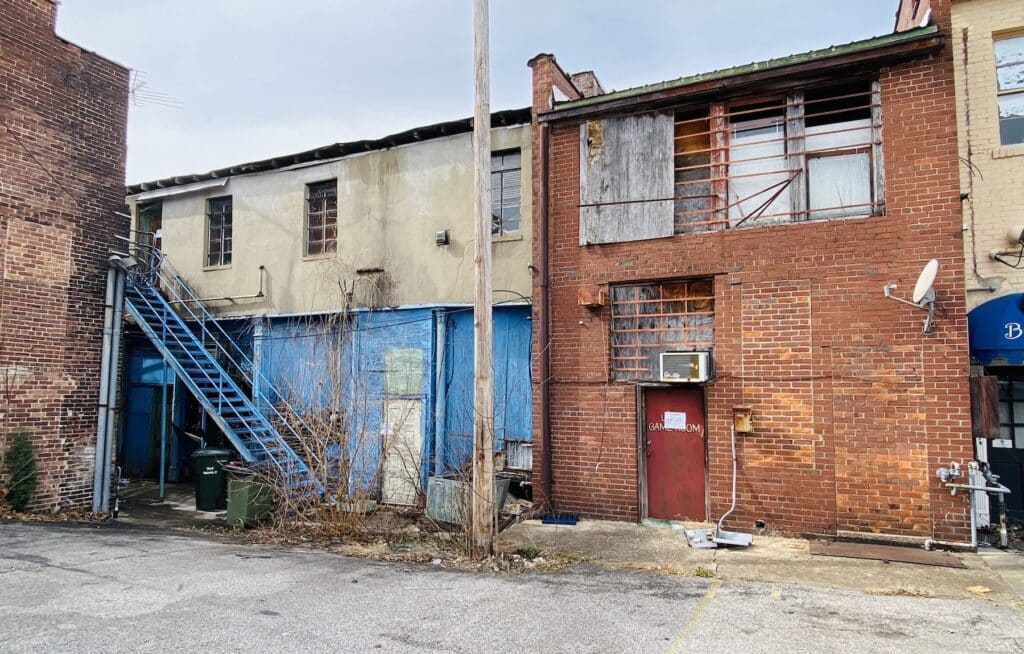
Lee’s Game Room
Located at 806 S. Main St., the building consists of load-bearing brick walls and a wood-framed roof, walls and floors, the engineer noted.
The floors and walls closest to the front entrance “are mostly intact but there are signs of ceiling leaks and standing water,” Gardner wrote. “The middle and rear portions of the building exhibit areas of decayed floor framing.
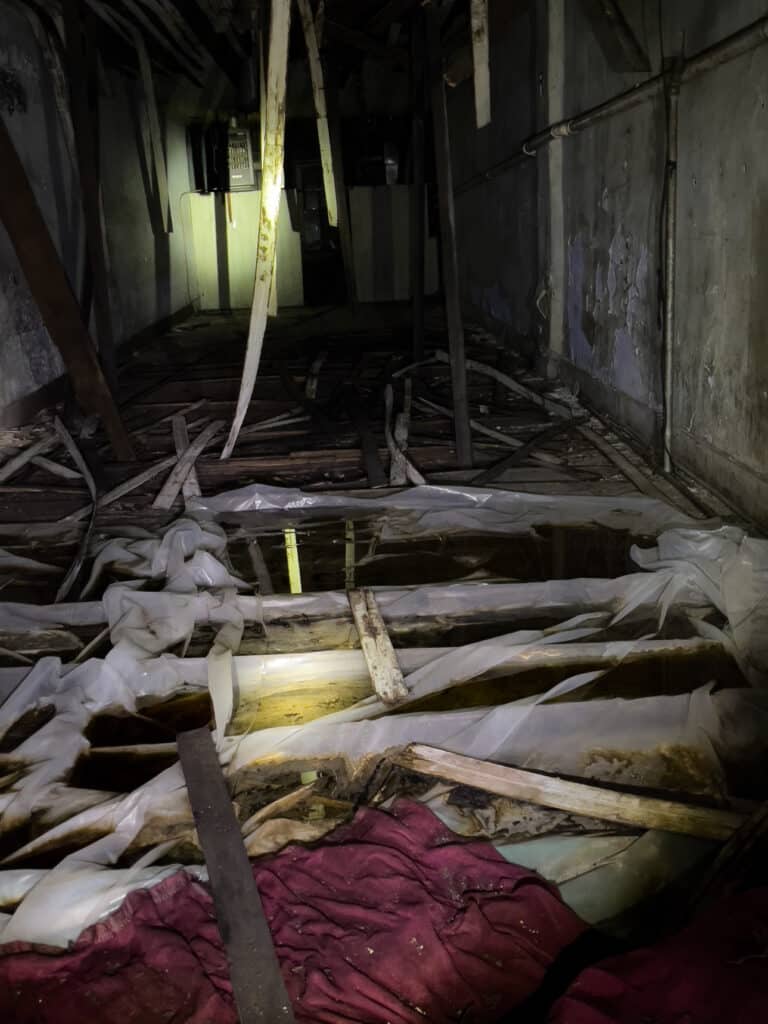
“At the second floor we observed numerous roof leaks and decayed floor and roof framing. Only the rear third was safe to access. The front two-thirds of the second floor framing are unsafe to walk on. Plastic sheeting has been placed on this area of the floor, which is holding water from the leaking roof above.”
Wiring issues created potential fire hazards, said Gardner, who recommended power to the entire building should be turned off immediately.
The engineer did not review the roof on any of the properties he inspected. But he said it was “reasonable to assume there was significant roof issues” based on the extent of water damage seen inside.
The building’s “severe structural issues” will continue to worsen without remediation and should be considered an “imminent danger,” Gardner wrote.
Holland’s Opera House
Constructed in the early 1880s by R.H. Holland, the building originally had a third-floor auditorium with seating for 800 people and a large stage, said Turner, the county historian. (For comparison, the Alhambra Theatre has 650 seats.)
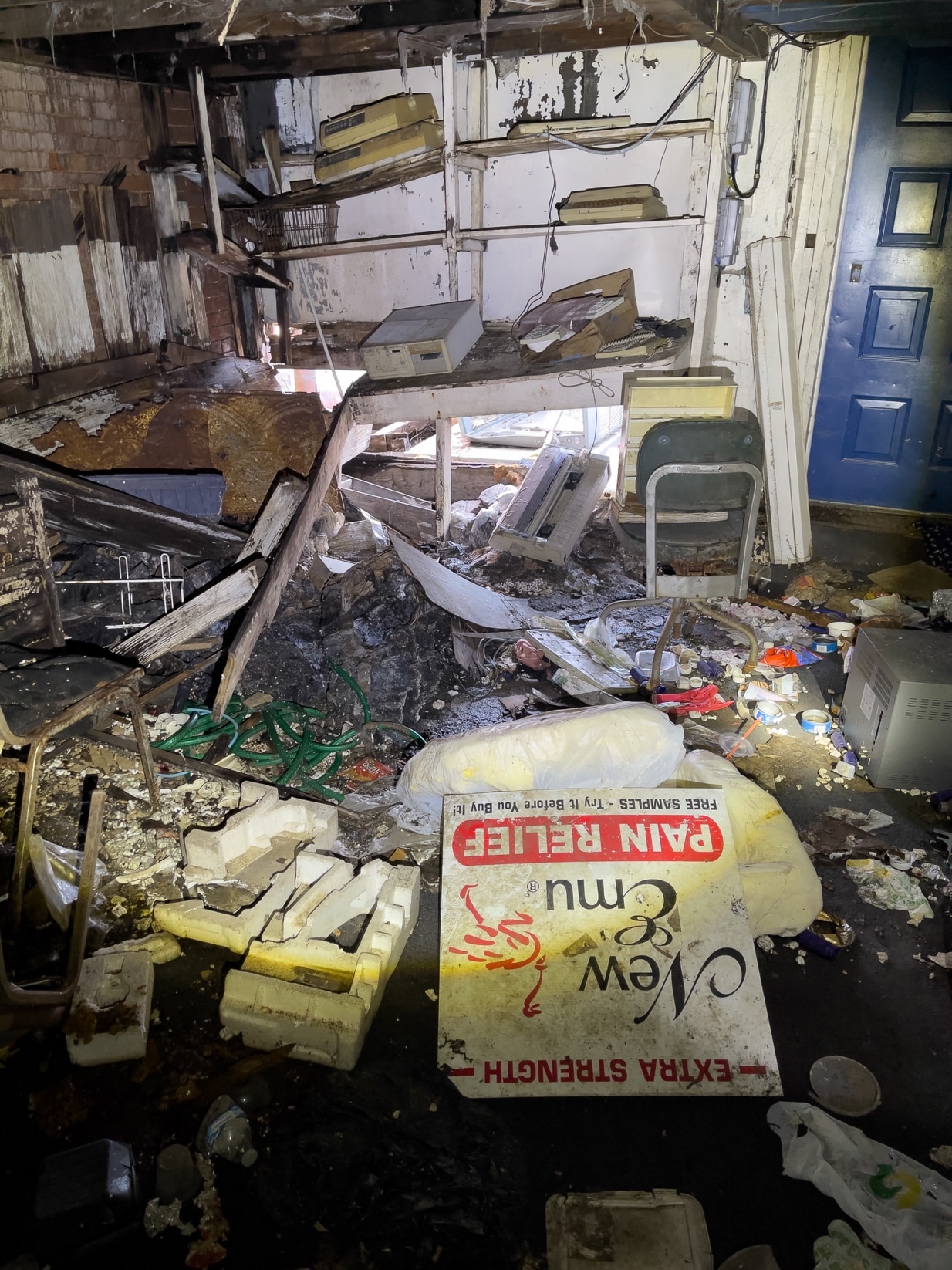
It opened in 1882 with live performances by musicians, actors and speakers. The first movies shown in Hopkinsville were at Holland’s in 1905, said Turner. The third floor closed in 1916. Turner said he saw the auditorium years after it had shuttered to the public.
The building was about a century old when a severe storm hit the roof. At that time, the former WKOA radio station had its offices on the second floor of the building.
A mid-century modern façade of shiny metal was at some point attached to the front of the building’s second floor. Of that, a contributor to the “Cinema Treasurers” website that features thousands of theaters across the country wrote, “The front of the building still exists, but has been completely butchered by horrible remodeling.”
The old opera house is divided into two main spaces on its first floor, both of which have “extensive water damage” and “failed wood framing” in the floors and ceilings, Gardner reported. These portions are not safe for occupancy, he said.
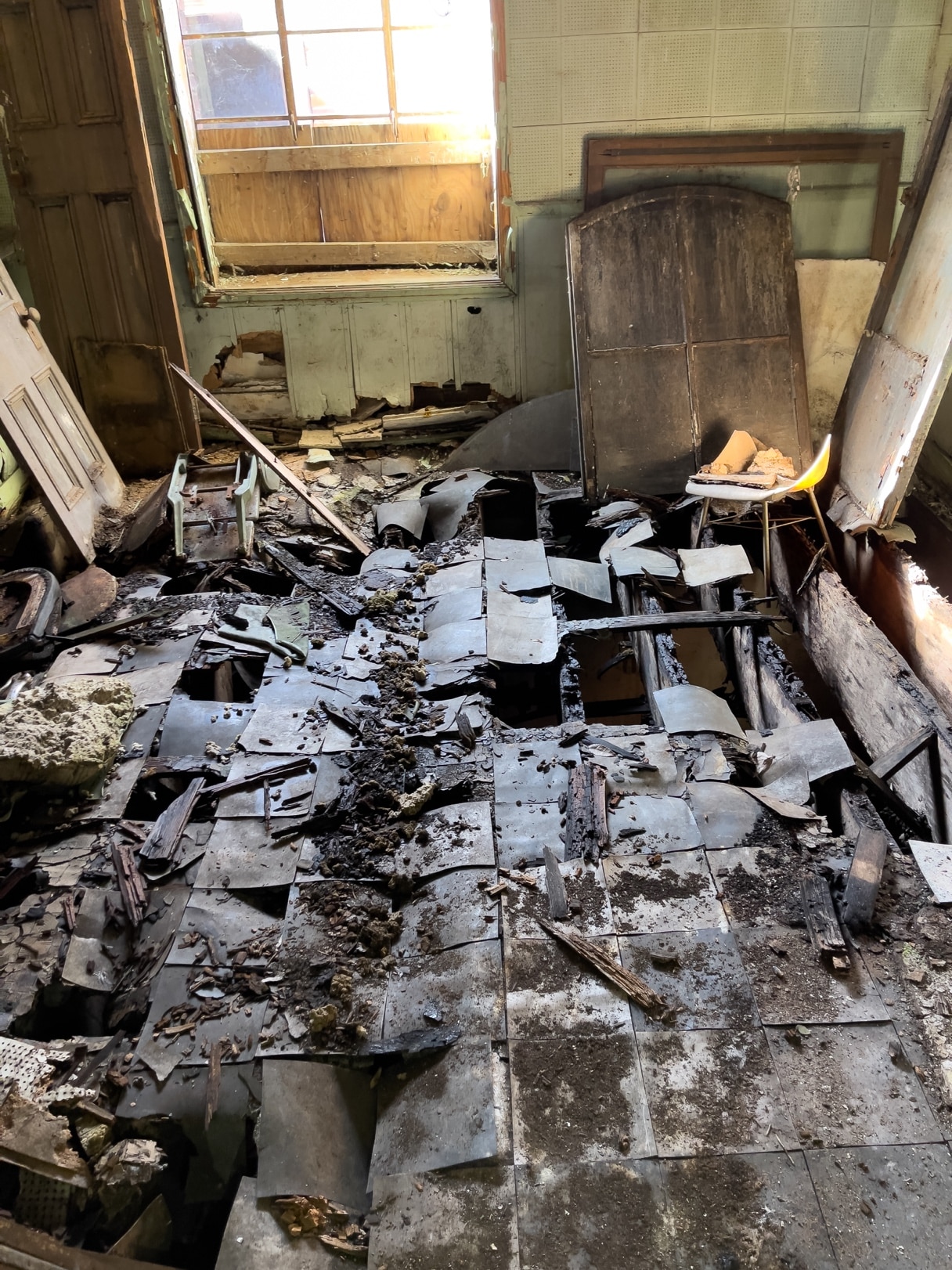
The left side of the opera house, adjacent to the pool hall, housed Wood’s Drug Store for approximately 70 years and closed in 2007, according to history of the community co-authored by Turner and Chris Gilkey. J. Noble Hall operated Hall’s Drug Store in the space for about 15 years before being bought out by C. Kenneth Wood in 1938.
The right side of the first floor previously housed a diner. It is adjacent to a narrow alley separating the building from the former Phoenix Hotel, a property owned by Bobo Cravens that is also newly condemned, but has not been recommended for demolition.
“At the second floor we observed numerous roof leaks and decayed floor and roof framing. The floor in several locations is not safe to access,” Gardner wrote.
On the side of the building that housed the drug store, he noted, “There is evidence of public inhabitants having stayed in the rear portion of the building, gaining access through holes in the rear wall. This portion of the building not safe for occupancy.”
Phoenix building
Gardner also filed a report on the Phoenix building, after he and Sivills inspected the property on Jan. 6.
Although he did not recommend immediate demolition of the property, he did determine it was unsafe for occupancy. Following the engineer’s recommendation, the city gave the owner 90 days to tell the city if he has a plan to remedy the problem. Bobo Cravens has moved to Lexington and his son, Al Cravens, is handling matters for his father.
Humphries, the attorney representing the Cravens family, is the last tenant in the Phoenix building. The city gave him 45 days to move from the building, and he is in the process of setting up a new office downtown.
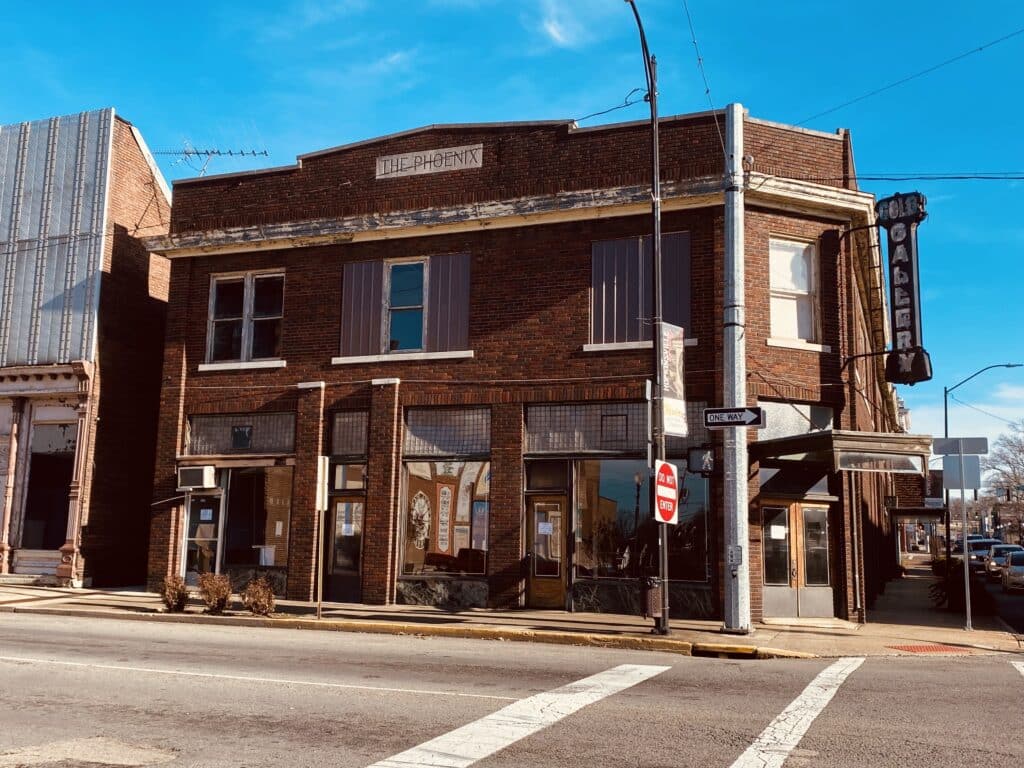
Legal steps
The city’s approach to resolving the situation offers two solutions: The owner can pay for the demolition himself or he can release it to the city.
City Attorney Doug Willen recently presented a “Consent and Release” form to Al Cravens that would allow the city to demolish the opera house building. The city would not hold the owners responsible for the cost of demolition. The city would be authorized to file a lien on the property.
“The Owners acknowledge that while they are not personally liable for these charges, the described property may be sold to pay for the same,” the city’s proposed legal agreement states. “The Owners agree to deed said property to the City in lieu of foreclosure of said liens.”
Humphries, in an email exchange with Willen that he provided to Hoptown Chronicle, said the city had taken an “adversarial” position against his client. Humphries said his client would not sign the consent agreement without knowing more about the demolition plans, including the cost.
“I fully suspect that the demolition of the pool hall will be made easier by the demolition of the Holland Opera House at the same time, but until my clients and I know the costs of demolition of the Holland Opera, as in what the City has agreed to pay its contractor, and who that contractor is, the Holland Opera House will not be a part of the demolition project,” Humphries wrote.
Willen responded that Humphries should read the engineering report, which states the property is “an immediate danger and needs to be demolished.” He added, “We offered to allow your client to sign a consent and release so as not to have personal liability. If you are advising your client to refrain from signing, that is your choice. We will proceed accordingly.”
Downtown aesthetics
If the pool hall and opera house buildings are demolished, the action would result in two significant outcomes. First, one of the most obvious eyesores would be removed from the heart of downtown. Second, there would be a gaping hole on the landscape near the spot that many consider the center of town, Ninth and Main streets.
There are currently no building codes that require a type of new construction that would complement the surrounding historic buildings downtown. Although the city would have some leeway to affect the use of that site if it obtains the property through the consent agreement, a new developer might not be held to a standard that fits with the existing architectural styles.
Jennifer P. Brown is co-founder, publisher and editor of Hoptown Chronicle. You can reach her at editor@hoptownchronicle.org. She spent 30 years as a reporter and editor at the Kentucky New Era. She is a co-chair of the national advisory board to the Institute for Rural Journalism and Community Issues, governing board president for the Kentucky Historical Society, and co-founder of the Kentucky Open Government Coalition.


